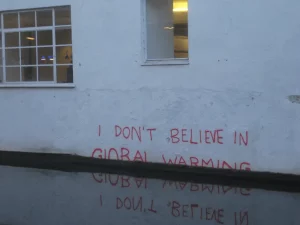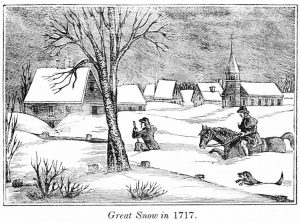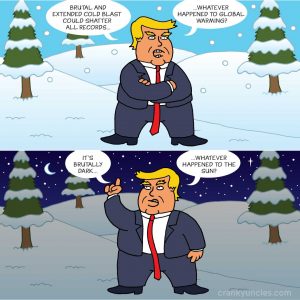Thanksgiving advice, 2021: How to deal with climate change-denying Uncle Pete
Posted on 24 November 2021 by Guest Author
This is a re-post from the Bulletin of the Atomic Scientists by Richard Somerville
“Birds of a feather flock together,” so I am sure that nearly all of those reading this article accept the main findings of climate science. Yet many people don’t. Instead, they believe a variety of climate myths.
These include claims that the world isn’t warming; or if warming is occurring, it is natural and not human-caused; or that volcanoes produce more carbon dioxide than we humans do. I know none of you believes these myths, but it seems that almost everybody has an unpleasant relative—call him Uncle Pete—who does, and who comes to dinner. Pete spoils the family mood by making these false claims, which he found on talk radio or the Internet.
 Graffiti in London, possibly the work of noted street artist Banksy. Image courtesy of Matt Brown/Pixabay
Graffiti in London, possibly the work of noted street artist Banksy. Image courtesy of Matt Brown/Pixabay
I’ll tell you in a moment why some of the most frequently repeated claims are just plain wrong. I won’t have time to cover all of them, and I recommend the website skepticalscience.com for the whole story. It’s a collection of the most commonly heard climate myths, and why they are all dead wrong. Skepticalscience.com is your key to refuting your own Uncle Pete.
Start with the myth that the warming we have observed in recent decades is natural and not human-caused. First off, let’s be clear: The climate has indeed changed naturally in the past, with ice ages being an obvious example. But natural causes simply cannot explain the recent warming. How do we know that? It’s very like the story of wildfires, which can be caused naturally, by lightning. But they can also be caused by people, either by carelessness or by arson. And wildfire experts can investigate after a wildfire and determine what caused it. They know how to do the detective work.
We climate scientists are good detectives too. We have discovered what paces the ice ages. It is the slow changes in the Earth’s orbit around the sun, which affect how sunlight is distributed over the Earth’s surface in the different seasons. Over many thousands of years, these effects are strong enough to cause ice ages to come and go. But over short times, just a few decades, the orbital changes have much too small an effect to produce the observed large warming that has recently occurred.
 Woodcut of a famous 18th-century winter in Massachusetts, during what some have called the “Little Ice Age,” for lack of a better term. But compared to full-blown ice ages, it was short-lived and puny, scientists say. Image from “History and Antiquities of New England,” published 1856. Courtesy of New York Public Library. See related Bulletin article “Little Ice Age? No. Big Warming Age? Yes.”
Woodcut of a famous 18th-century winter in Massachusetts, during what some have called the “Little Ice Age,” for lack of a better term. But compared to full-blown ice ages, it was short-lived and puny, scientists say. Image from “History and Antiquities of New England,” published 1856. Courtesy of New York Public Library. See related Bulletin article “Little Ice Age? No. Big Warming Age? Yes.”
Through this kind of research, we have quantitatively ruled out all the other natural processes known to affect climate. For example, the sun powers the entire climate system, and the amount of energy given off by the sun does vary. But we measure this energy very accurately, and we can demonstrate that its changes are much too small to have caused the observed warming. As for the claim that the extra carbon dioxide added to the atmosphere by human activities is tiny compared to the amounts produced by volcanoes, that too fails quantitatively. Measurements show that human activities, mainly burning coal and oil and natural gas, produce about 100 times more carbon dioxide than volcanoes do.
By burning fossil fuels, we humans have taken over the role of deciding what the climate in coming decades will be. We are no longer passive spectators in the global climate change pageant. We have become the actors. Science provides convincing evidence that the heat-trapping gases produced by human activities are the main cause of the warming observed in recent decades. This aspect of climate science is very firmly established, going back to definitive laboratory experiments in the 1850s. Those experiments showed that carbon dioxide and other gases, present in small quantities in the atmosphere, have powerful heat-trapping properties. In recent decades, the fingerprint of the observed warming, such as how it varies with altitude and geography and season, matches the pattern that we expect from adding heat-trapping gases to the atmosphere.
We’ve found the enemy: He is us.
There are similar convincing refutations of all the other common climate myths. That’s why many studies have shown that about 97 percent of the climate scientists who are most active in publishing research on climate change agree that the observed recent warming is real and serious and overwhelmingly human-caused. Nevertheless, Uncle Pete remains unconvinced. He continues to repeat the myths.
You might well ask, “Why is Uncle Pete so stubborn and so resistant to overwhelming scientific evidence?” That’s a very good question, and here is my answer.
 What to say to Uncle Pete, without ruining the holiday? Or driving yourself crazy? It’s all in addressing what his real concerns are. Image courtesy of Shutterstock
What to say to Uncle Pete, without ruining the holiday? Or driving yourself crazy? It’s all in addressing what his real concerns are. Image courtesy of Shutterstock
For many skeptics or contrarians like Pete, the climate change issue is not a science topic at all. For Pete, it is simply an opportunity for the government, and liberals and environmentalists, to make rules and regulations, to interfere with markets, and to diminish the personal freedom of individuals. For Pete, it is just one more way for the authority of the state to control the lives of citizens. This view has nothing to do with science, and no argument based only on science can change it. Uncle Pete, like some actual people I know, may seriously fear that the government will not only decide what kind of car he will be allowed to drive, but will ultimately want to force him to limit his individual carbon footprint—that is, to ration his personal emissions of heat-trapping gases.
Uncle Pete has a high opinion of the free market. He is confident that government actions tend to hinder free markets and thus have the effect of limiting economic progress. He is suspicious of subsidies for renewable energy. He is sure that renewables will never be feasible without big subsidies. Uncle Pete couches his opposition to carbon taxes or fees in statements of this sort: “If you let people keep more of their money, they will invest it in the future.” Once again, science is irrelevant here, and no claim that science has shown or proven this or that fact will change Uncle Pete’s mind.
It’s sad but true that most Americans have never met a scientist. Uncle Pete may have his own somewhat strange ideas about how science works and what scientists do. The concept of “peer review” carries no weight at all with Pete; he can easily imagine a corrupt and powerful scientific establishment, conspiring to deny research funding to scientists who disagree with prevailing opinions, and to prevent them from publishing. Pete likes to mention Galileo as an example of an outlier in science who turns out to have been correct. He forgets that Galileos are extremely rare, and that almost everybody who considers himself a Galileo is badly mistaken. Pete may cite eugenics as evidence that the scientific mainstream is indeed sometimes wrong. Pete is very suspicious of us scientists.
Social science tells us that people tend to trust those who share their values and to distrust those who do not. We all know that wedge issues, such as abortion and evolution and gun control, bitterly divide this country, and it is high time for us to realize that climate change is a very big wedge issue for Uncle Pete. His natural distrust of academics and elites generally is increased if he thinks climate scientists are arrogant people who are scornful of his opinions, who mock his values, and who dismiss his most firmly held convictions.
I urge each of you to engage with the Uncle Pete whom you may know. Have a civil conversation. In his heart, Uncle Pete would probably admit that everybody is entitled to his own opinions, but not to his own facts.
When it comes to facts, we scientists have the high ground. The world is warming. It’s not a hoax. We measure it. The warming did not stop in 1998. All the warmest years are recent years. 2016 will be the warmest year on record. 2015 is second. 2014 is third. The atmosphere is warming, and so is the ocean. Sea level is rising. Ice sheets and glaciers are shrinking. Rainfall patterns and severe weather events are changing. Climate change is real, and serious, and happening right here, right now. And it isn’t natural. Human activities are the dominant cause of the climate changes that we have observed in recent decades.
But none of these facts tells us exactly what we should do about climate change. Science can inform wise policy, but it cannot decree or prescribe what the best policies will be. There is no silver bullet, but there is lots of silver buckshot. The main barrier to action is a lack of political will.
In deciding climate policy, science matters, but so do values, priorities, and political convictions. Given the same facts, different reasonable people can easily prefer different policies. For Uncle Pete, attacking climate science and scientists is simply a disguise for what concerns him, which is the prospect of liberals and environmentalists dominating policy, and of a government spinning out of control, a government that in Pete’s view seizes power, limits freedoms, increases taxes, regulates markets, and diminishes prosperity.
We do not yet have national agreement on climate change. As you know—and I hope this will not shock anybody—some elected officials in the federal government sound just like Uncle Pete. Despite the strong scientific consensus, climate change policy is contentious politically.
 Image courtesy of John Cook of the Center for Climate Change Communication at George Mason University. Cook founded Skeptical Science, co-authored college textbooks on climate change denial, and developed the smartphone game Cranky Uncle using critical thinking and cartoons to counter climate misinformation. [See Cook’s original Bulletin article “Forecast: flurries of shivering climate-change deniers”]
Image courtesy of John Cook of the Center for Climate Change Communication at George Mason University. Cook founded Skeptical Science, co-authored college textbooks on climate change denial, and developed the smartphone game Cranky Uncle using critical thinking and cartoons to counter climate misinformation. [See Cook’s original Bulletin article “Forecast: flurries of shivering climate-change deniers”]
I am not an expert on energy policy or taxes, but as a climate scientist, I can say something with very high confidence about what will happen if we do nothing. Deciding to do nothing about climate change is like deciding not to have serious elective surgery, such as declining a coronary artery bypass operation that your cardiologist recommends. The operation will involve risks and costs. But declining it will also involve risks and costs, including the risk of a fatal heart attack.
Sadly, we don’t have enough conversations about climate change. The media largely avoid the subject, and it was almost invisible in the recent campaign for president. Today, the fact is that we, you and I and the other 7.4 billion living people, now have our hands on the thermostat that controls the climate of our children and grandchildren. A considerable portion of the carbon dioxide we emit can remain in the atmosphere for centuries and longer. Thus, it accumulates. There is a given allowed amount of carbon dioxide in the atmosphere that we must not exceed if we want to limit warming to any particular target we pick. For the warming target of the Paris agreement, we’re already about half way to that allowed amount, so we do not have much time left to bring emissions to nearly zero. That’s why it’s urgent to drastically reduce global carbon dioxide emissions and to do it quickly before we exceed that amount.
It’s important to understand that once the world has agreed on a target of how much warming is to be allowed, science can say approximately how much more carbon dioxide can be emitted. The urgency of reducing emissions thus arises directly from the physics and chemistry of the climate system. It has nothing to do with politics.
Mother Nature reacts to the total amount of carbon dioxide. The more carbon dioxide there is in the atmosphere, the greater the climate change will be. If we who are alive today do nothing about climate change, and if the world continues to use the atmosphere as a free dump for carbon dioxide and other waste products of an energy system based on fossil fuels, then we are effectively sentencing future generations to the consequences of a severely disrupted climate. Also, the disruption will not be brief. It will take many thousands of years for the climate to recover after we stop emitting carbon dioxide. So it’s a long sentence. This is not a partisan political statement. It is well-supported, solid science.
 Our climate system is like an irritable beast, that over-reacts to even small prods. Right now, we’re hitting it with a big stick in the form of excessively high carbon emissions from human activity—which our cranky uncle refuses to accept is happening (and ulimately causes the bear to be poked even more). Image courtesy of John Cook, from his Bulletin article “Making sense of your climate-denier”
Our climate system is like an irritable beast, that over-reacts to even small prods. Right now, we’re hitting it with a big stick in the form of excessively high carbon emissions from human activity—which our cranky uncle refuses to accept is happening (and ulimately causes the bear to be poked even more). Image courtesy of John Cook, from his Bulletin article “Making sense of your climate-denier”
The Pentagon, which is not a cabal of liberal environmentalists, takes this issue very seriously, and it has repeatedly characterized unmitigated climate change as a threat multiplier. In the decades and centuries ahead, doing nothing means the world will inevitably see devastating climate change, including agricultural disasters on an immense scale and coastal cities abandoned worldwide, because of sea level increases of many feet.
Vast numbers of environmental refugees will be created, and we will see the destabilization of governments, especially in failed and failing states. In wealthy and powerful countries like the United States, governments coping with severe climate change will surely have to act forcefully, including using emergency powers, as in wartime, to preserve order and to minimize chaos and damage. Ironically, in my view, doing nothing about climate change—Uncle Pete’s preference—is thus likely to force governments to do exactly what Uncle Pete fears most: seize power and limit freedoms. Doing nothing is a disastrous policy option.
In your civil and mutually respectful conversation with your own Uncle Pete, I hope you can help him think seriously about the prospect of such a horrible, but very preventable, future. We are at a critical crossroads. We still have a chance of limiting climate change to a tolerable level, a level that offers some hope of successful adaptation. Our window of opportunity is still open. But it won’t stay open much longer.
We must act.
We can’t dither any longer.
If Uncle Pete wants to keep the government from controlling his life and diminishing his freedom—as most all of us do—then we all need to learn about and accept the science. We all need to take the threat of climate change seriously. We all must act wisely, and urgently, to minimize that threat and thereby limit the damage of climate change to tolerable levels.































 Arguments
Arguments






























This article has great information but as far as Uncle Pete goes, smile, nod, and quickly change the topic. According to the Yale program on Climate Communicatio, only 8% of Americans are "Uncle Petes". Nothing can change their mind so save yourself the frustration and keep your gathering pleasant.
https://climatecommunication.yale.edu/publications/global-warmings-six-americas-a-review/
Instead be thankful for the 92% of people you can work with to learn about climate change and get going on implementing solutions.
Here's a quote from an editorial in my local paper, The Dai Inter Lake, published today (Thanksgiving 2021):
"When we say our blessings at Thanksgiving dinner this year, may our thoughts be for the greater good and our words be carefully parsed for a community and, for that matter, a world that so desperately needs our love, and may the gratitude in our hearts shine toward finding solutions … and being part of them."
Happy Thanksgiving!
Robin
Typo correction: my local paper is the "Daily Inter Lake"
Editorial reference if you are interested:
https://dailyinterlake.com/news/2021/nov/25/community-making-difference-and-creating-change/
Robin, I agree there is no point ruining a family gathering by debating climate change with Uncle Pete, and its best to change the subject. Although I find it takes me an effort of will to do this. I was silently thinking stick a sock in his mouth and sit him in a corner of the room and shove a bottle of whisky in his hand to keep him amused. I know we cant really do this but it was an interesting, satisfying thought.
However what do we do when uncle Pete appears on websites like this? This is more perplexing because he (or she) can sway impressionable people following the discussion that are mildly sceptical. There seems to be a school of thought that says ignore Uncle Petes when they rear their ugly heads in public forums. Engaging with them draws attention to them so its thought. Pretend they don't exist. In my observation climate scientists have mostly done this (this website excepted) but this strategy has obviously not stopped Uncle Pete causing havoc.
Personally I think its better to rebut their claims but without getting too much into an extended one on one debate. If possible dont even use their name. You are really not trying to convince or inform Uncle Pete, but other people involved in the discussion or reading it.
Some people directly engage Uncle Pete partly just to ridicule them and for entertainment. I confess I've sometimes done this myself. But this is a risky strategy because it can alienate people who dont like such harsh treatment and stong language.
Uncle Petes are very frustrating. I wish they would just STFU.
Nigel - Ha! Yes, believe me, it is very frustrating for me when there's an Uncle Pete around. I did enjoy reading your post! Thank you.
Three years ago I published a blog post sharing my thoughts about Discussing climate change on the net which might come in handy.
Unfortunately, there isn't so much information in this post as there is social reinforcement--it goes back to the old trope of the crazy uncle and serves to encourage thinking the other side is stupid.
I also notice that certain supporting information like that the pentagon takes climeat science seriously neglects to mention that all, that is all, of their predictions about climate were wrong. The Climate Discussion Nexus offers a lot of actual, real information without so much "snide." This one is about the Pentagon predictions:
https://www.youtube.com/watch?v=yj83l0mcWUY
We should be focused on the actual pace of change and its effects as well as what to do about it, not scoring points on who was right or wrong all along. This video needs to be posted so it's clear this article is not a font of scientific accuracy, but what we need to do is focus on reasonable action.
This article fails in that way and can only serve as candy for true believers.
The Pentagon predictions weren't wrong: they were about what might happen were an abrupt climate change to occur (as happened 8000 years ago) rather than the gradual change currently observed and predicted. They didn't suggest such an event was likely or imminent. The report should be read in the same light as one outlining the consequences of, say, a nuclear war between Russia and China in 2004.